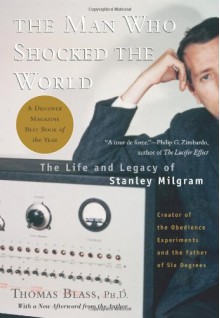
Milgram was an experimental psychologist who carried out important research into social phenomena including, most famously, obedience to authority, but also the "small world problem," his demonstration that a chain of people on first name terms need normally be only about six people in length to join any two humans. He made many other important contributions to the field, not least by developing the concept of urban psychology.
This biography provides an insight into Milgram's life and work which turns out to have many good qualities. He had limited family resources and relied on public funding and scholarships to continue in education. It is interesting to compare the situation when his wife started in paid employment primarily to help fund their daughter's expensive university education. The real factor making his academic career poossible, however, was the networks he formed with established academics, as teachers, mentors and friends. It is interesting to observe the personal connections that shaped the research interests of key people in the field and this fits very much with the proposition of Randall Collins in The Sociology of Philosophies. For example, the book mentions "... three former teachers who had been his mentors and with whom he had continued a relationship of mutual fondness and respect: Gordon Allport, Roger Brown and Jerome Bruner." [p146] Solomon Asch was also important. In 1966, Milgram was having the greatest difficulty securing a position anywhere when his friend and former Yale colleague, Howard Leventhal, was recruited to the newly formed City University of New York and insisted that he would only accept on condition that Milgram was also offered a secure post there. [p156] For anyone considering an academic career, this lesson cannot be over emphasized.
One problem for Milgram was the prejudices and strong feelings provoked by his work on obedience. Roger Brown believed "... that some people "attributed to [Milgram] some of the properties of his experiment. That is, they thought he was sort of manipulative, or the mad doctor or something of this sort...They felt uneasy about him." [p153] But he also encountered the criticsm that his work lacked a clear, theoretical basis. For example:
"There is no clearly identifiable Milgram school of social psychology... This lack of continuity is due to Milgram's approach. It was phenomenon oriented rather than theory based. As one writer noted: "Most psychologists test hypotheses, Milgram asks questions." The majority of Milgram's studies were driven by his curiosity, his quest to verify the existence of a phenomenon or regularity in behaviour suggested by subjective experience, and once established, to identify the forces that led to variations in the observed phenomena. ..But progress in science depends, at least partially, on cumulative research - that is, experiments aimed at testing one of a number of hypotheses derived from a theory... phenomenon-centred research is not cumulative. Once you have verified the existence of some behavioural regularity, and perhaps identified its boundaries, there is nowhere else to go." [p291]
The book indicates many times that Milgram was not the best theorist for even his own research findings, and his proposals were at times open to question. That was not his gift. What he did have was a marvellous ability to design good experiments and this helped to establish the still new field of social psychology as a credible scientific endeavour. e.g.
"While the content of Milgram's research interests defies pigeonholing, virtually all of his studies share an important stylistic characteristic. The object of study - the dependent variable - was typically some form of concrete, observable behaviour; be it picking up a "lost letter" or giving up one's seat on a subway train. As he told an interviewer: "Only in action can you fully realize the forces operative in social behaviour. That is why I am an experimentalist." "[p192] Also:
"The creative claim of social psychology lies in its capacity to reconstruct varied types of social experience in an experimental format, to clarify and make visible the operation of obscure social forces so that they may be explored in terms of the language of cause and effect." (Milgram in 1977) [p228]
Again, anyone interested in studying psychology academically needs to appreciate the importance of being able to design and implement good experiments. But what the book also illustrates is the need to cope with considerable stress, in order to conduct research with human subjects. In the obedience studies, it is evident that many participants were very agitated by the experience, something requiring skill from the experimenter. But also, in other experiments such as asking passengers on a train to give up their seats, the stress for the experimenter was also hard to tolerate. That reflects our natural reluctance to break social rules and is very hard to overcome. So anyone who thinks they have what it takes to be an experimental psychologist, beware.
Milgram's research was arguably most driven by simple curiosity:
"I believe that a Pandora's box lies just below the surface of everyday life, so it is often worthwhile to challenge what you most take for granted. You are often surprised at what you find." Milgram. [292] What he found was, of course, hugely important and the final chapters of this book provide a useful review of some of the ways in which Milgram's work has been influential, leaving a legacy that is highly regarded.
Milgram was not greatly honoured in his day, probably because he was seen as contentious, yet it is arguable that his research has done more than any other to demonstrate the social relevance and importance of the work done in experimental psychology. I do not want to promote the idea that being useful is all that matters, but it does obviously matter all the same. He is a fascinating character, his work was extraordinary and this book does it justice.
Some more quotes:
"The social psychology of this century reveals a major lesson; often, it is not so much the kind of person a man is as the kind of situation in which he finds himself that determines how he will act." (Milgram) [p101]
"When an individual wishes to stand in opposition to authority, he does best to find support for his position from others in his group. The mutual support provided by men for each other is the strongest bulwark we have against the excesses of authority." (Milgram) [p108]
In 1964, Milgram and Paul Hollander co-authored a piece for The Nation about Kitty Genovese, who was was killed on March 13, 1964 as she was going home from work. Her killer stabbed her repeatedly for half an hour, during which a journalist later established that 38 of her neighbours either witnessed part of the attack or heard her cries for help without acting to help or call for help.
"The article brought a refreshing rational and non judgemental approach to a tragic event in which outrage tended to blur the public's perspective." [p168]
"I started work on obedience in 1960, a long time ago, and it would be nice to move on... But professional life turns you into a kind of snail, in which everything you do becomes another curl of your ever enlarging carapace." (Milgram, letter, 1976) [p232]
"Without a well developed capacity for obedience, society could not function. Yet under the sway of obedient dispositions, morality vanishes."(Milgram 1967) [p279]
"The implicit model for [my] experimental work is that of the person influenced by social forces while often believing in his or her own independence of them. It is thus a social psychology of the reactive individual, the recipient of forces and pressures emanating from outside oneself. This represents, of course, only one side of the coin of social life, for we as individuals also initiative action out of internal needs and actively construct the social world we inhabit. But I have left to other investigators the task of examining the complementary side of our social natures." Milgram [p290]


 Log in with Facebook
Log in with Facebook 










